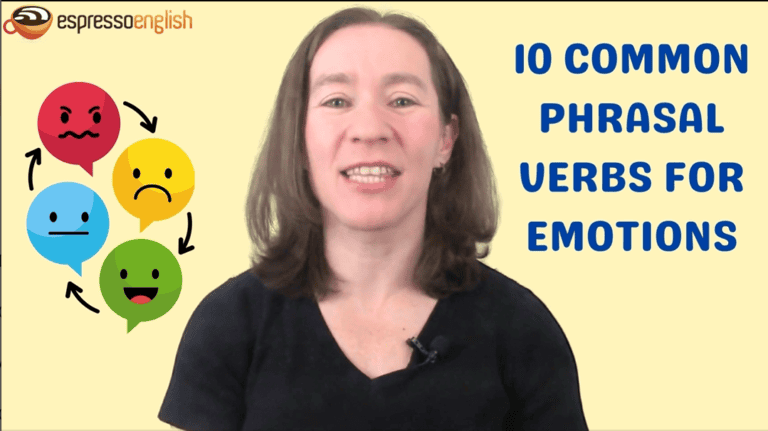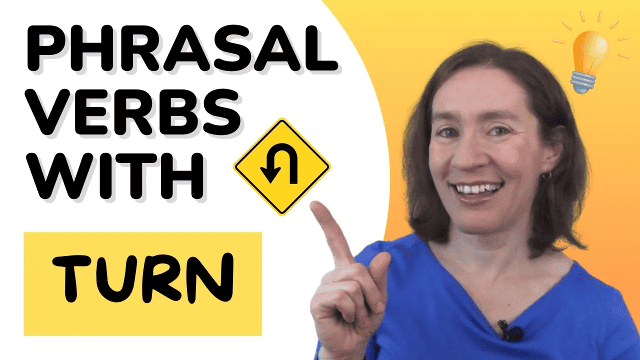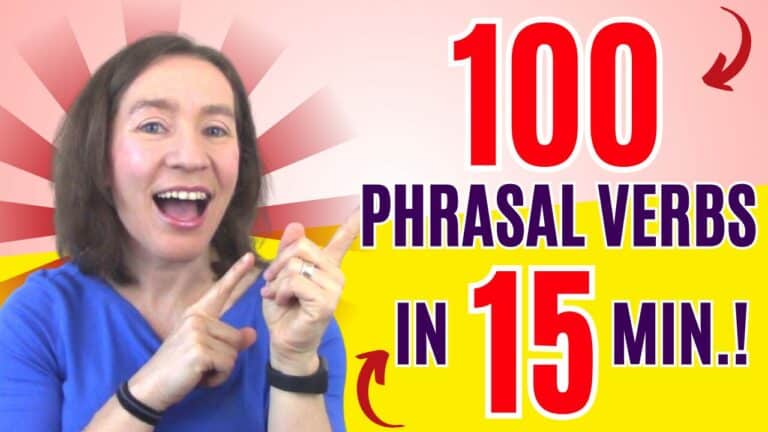
Hey everybody – listen up! Do you know what that means? Telling people to “listen up” means you want them to pay attention. This is an example of a phrasal verb being used as a command.
Another one you probably know is “Watch out!” – we use this when we want to warn somebody about danger.
Today I’ll teach you 20 phrasal verbs that are often used as commands, and what they mean. Phrasal verbs like these are so common in everyday English, but they can be a little hard to learn because they’re all so similar – back off, back out, back up, back away, etc.
That’s why I created the Phrasal Verbs in Conversation Course – to help you learn them in a natural way, by studying conversations. You’ll learn more than 500 phrasal verbs inside this course, and I think you’ll really enjoy it. Click the course to get started:
Our first phrasal verb command is “cheer up!” – this is telling someone to be happier, not be sad. We usually use this for minor sadness, not for major things like if someone’s sad about a death or major tragedy. If my daughter is sad because it’s raining and we can’t go to the playground, I might say “cheer up! We can still do fun things at home.”

Next we have “calm down!” and “chill out!” – these are telling someone to stop being angry or upset.
If someone is acting very immature, so that means an adult acting like a child, doing silly/annoying things, we can tell them to “grow up!” – this means “act like an adult, stop being childish.”

When someone is acting aggressively, for example, a pushy salesperson is getting right up in your face, or someone is trying to start an argument with you in a bar, you can say “back off!” to tell them to stop bothering or threatening you.

When you want someone to wait a moment, or a few moments, you can say “Hang on!” or “Hold on!” – these are both telling them to wait.
We also have the phrasal verb command “Wait up!” and this is used in a very specific situation, when someone is leaving or walking away from you and you want them to wait or slow down, so that you can catch up and go with them.
And the other person might tell you “Hurry up!” – they are telling you to move faster.
The expression “Come on!” has a few different meanings. You can say “Come on!” to encourage someone to move faster, similar to “hurry up.”
You can also say “Come on!” to encourage someone to do something you want them to do – like if everyone is dancing but one friend is sitting on the side, you could say “Come on!” to encourage them to join.
If you say “come on” in an irritated voice, it’s expressing your annoyance. Like when I need to print something out urgently and my computer gives me an error, I’d say “Oh come on!”
If your friend or one of your kids is acting guilty, like they’re ashamed or trying to hide something from you, you could say “fess up!” – this is telling the person to confess, to reveal to you what they did, especially if it was something bad or wrong.

If someone is taking a relatively minor situation too seriously, you could tell them, “lighten up!” – this means to stop being excessively serious or strict; they should relax and be happier.
Let’s say you want to sit on a bench at the park, but your kids are sitting there and taking up more space than necessary – you could tell them “scoot over!” which means to move to the side while in a sitting position – in order to make room for you to sit on the bench, too.

Sometimes when I’m taking a fitness class at the gym, the instructor tells us to “partner up” or “buddy up” – this means to form groups of two people each. Sometimes she also tells us to “line up” – to stand in a line.

Imagine that you’re trying to study, but your roommates are having a loud conversation – you might say “quiet down!” or “pipe down!” – these are both telling them to be quieter.

But maybe that starts an argument, and you get angry and tell them “shut up!” – that’s an extra rude way to tell someone to stop talking.
On the other hand, if someone is talking to you and they stop, maybe they hesitate before continuing, you can tell them “go on!” which encourages them to continue talking.
Finally, one thing I often tell my students is “speak up!” – this means “speak louder.” When you’re not confident about your English, you tend to speak quietly – but I want to help you speak up with my lessons.

There are so many more phrasal verbs to learn, and I’d be happy to help you learn and practice them in my phrasal verbs in conversation course!











